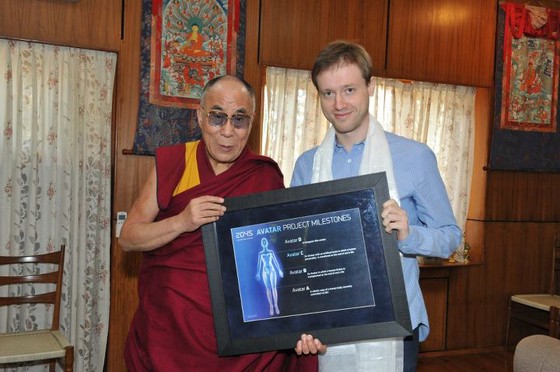semper occultus wrote:..calling all cars...massive thread hi-jack in progress !
So lets all shush shall we.


Moderators: Elvis, DrVolin, Jeff
semper occultus wrote:..calling all cars...massive thread hi-jack in progress !


Luther Blissett wrote:tazmic wrote:Having spent some time trying to understand Fuller, he's gone and spelled it out for me (17:54 -> 19:50):
Here, I've transcribed it:Steve Fuller wrote:…I do think there is going to be this issue of how much diversity is tolerable within an affordable medical system or welfare system, which is kind of the context in which the "racial hygiene" movement first got established, in the context of creating welfare states. I'm very much of the mind, if any of you are familiar with the history of philosophy, if you look at people like Leibniz, Hegel, all of these people are devotees of a certain branch of theology called theodicy, which is basically how god justifies evil in the world. If you've got this great god, why is everything so horrible? All that misery is a means towards a greeter end that will be realized in the fullness of time. As creatures created in the image and likeness of god, we participate in that process. It's just for us to, as it were, suffer as victims, but it's actually for us to be engaged with the process, and to experiment with the world, and experiment with ourselves, and to go forward, and transform things, and yes there will be a lot of damage on the way, yes a lot of people will die, but it will be in the name of a greater good. I actually do believe something like that I have to say. I do think that anyone who wants to get onboard with transhumanism or the enhancement project and really wants to think about this in a comprehensively social way, is going to have to live with that. In other words, you're gonna have to take that onboard, you can't get into this kind of blinkered libertarian world where everybody just makes their own little choices individually. Being involved in scientific experiments should be part of national service. You should be obliged to do it. The problem is that if this whole enhancement agenda, and all this scientization, technologization, if this is just something that people can choose to either be "in" or "out," given the current socioeconomic disparities in the world today, we're just going to see a wider and wider gap between the haves and the have-nots. So my point is that you've got to get everybody on board…
My position here is that transhumanism—the belief that technology can transcend the limitations of the human body and brain—and techno-utopianism—the idea that humans can create a progressively better future through the rational mastery of nature—are part of the family of Enlightenment philosophies. Transhumanism and techno-utopianism can be traced back to the original Enlightenment thinkers 300 years ago, and transhumanists need to understand how the ideological conflicts within transhumanism today are the product of these 300 year-old conflicts within the Enlightenment.
[...] The second question I want to address in these essays is how transhumanist technological utopianism has both inspired and retarded scientific and political progress over the last 300 years.
I want to take seriously the idea that “superlative technocentricity” performs an anti-democratic ideological function, that promising techno-fixes for social problems can be used to distract from immediate social needs and injustices. More darkly yet, I want to discuss how the techno-utopians’ association with eugenics and totalitarianism set back both democratic and scientific progress in the 20th century.
Starting with the “contradictions of the Enlightenment” I will be presenting seven arguments over the next couple of weeks:
First, that the Enlightenment project of Reason to which many transhumanists are committed is self-erosive and requires nonrational validation. Transhumanist advocates for Bayesianism and transcending cognitive biases need to confront the repeated implosions of the religion of Reason into romanticism and mysticism, and develop more sophisticated and nuanced defenses of rationality.
Second, while most transhumanists are atheists, their Enlightenment belief in the transcendent power of intelligence generates new theologies. These theologies can follow from consistently naturalist predicates and therefore call into question the presumption that transhumanists must be New Atheists.
Third, while most transhumanists are liberal democrats, their Enlightenment beliefs in human perfectibility and governance by reason can also validate technocratic authoritarianism. Even staunchly libertarian transhumanists appear to be blithely unaware that arguments for government by benign superintelligent beings that know human interests better than we do recapitulate arguments for totalitarianism from the French Revolution through Marxist-Leninism.
Fourth, transhumanists are divided on the balance between democracy and the market because anarcho-capitalism and radical democracy are the two most popular interpretations of the Enlightenment’s vision of a society of equal, self-governing citizens.
Fifth, transhumanists are in contradiction over the inevitability of progress because the Enlightenment tradition is conflicted between teleological expectations of unstoppable progress, on the one hand, and rational scientific awareness of the indeterminacy of the future on the other. We may even have inherited this problem from pre-Enlightenment millennialism, which simultaneously argued that God’s kingdom of heaven on Earth was inevitable, but that we nonetheless needed to devote ourselves to ensuring the defeat of Satan.
Sixth, transhumanists are divided between advocates of ethical universalism and ethical relativism because both are products of the Enlightenment. On the one hand, transhumanists advocate for a universal, non-anthropocentric standard of ethics and citizenship that would treat humans, animals, aliens, and robots alike based on their sentience and personhood. On the other hand, our decisions about which qualities to use as the basis of moral standing are profoundly and (so far) inescapably neurotypical and human-centric. It is not clear yet how we maintain a commitment to both moral equality and normative diversity.
Seventh, the center of the Enlightenment project is the individual self, seeking happiness, long healthy life, and free and equal exchange with other individuals. But the Enlightenment’s rational, materialist neuroscience reveals that there are no discrete, persistent selves, no “real me” homunculi in the brain. Transhumanism has therefore inherited, in the most acute form yet, the Enlightenment’s need to develop post-individualist values, to reinterpret liberty, equality, and fraternity for a world in which we no longer pretend that there are authentic selves.

tazmic wrote:..better future through the rational mastery of nature...

"The mature thing to do in our position as catalysts of evolution is to develop a stewardship that focuses on maintaining a balance between both the declining biosphere and the emerging technosphere – between old nature and next nature. Towards an environment in which both can find a place and live in relative harmony."



Earlier this week, The Atlantic ran an eye-catching, disturbing interview with a professor of philosophy and bioethics at New York University called S. Matthew Liao. He was invited to discuss a forthcoming paper he has co-authored which will soon be published in the journal Ethics, Policy & Environment.
But within just a few hours of the interview going live a torrent of outrage and abuse was being directed towards him online. As I tweeted at the time, the interview was indeed "unsettling". Liao explained how his paper – entitled, "Human Engineering and Climate Change" – explored the so-far-ignored subject of how "biomedical modifications of humans" could be used to "mitigate and/or adapt to climate change". The modifications discussed included: giving people drugs to make them have an adverse reaction to eating meat; making humans smaller via gene imprinting and "preimplantation genetic diagnosis"; lowering birth-rates through "cognitive enhancement"; genetically engineering eyesight to work better in the dark to help reduce the need for lighting; and the "pharmacological enhancement of altruism and empathy" to engender a better "correlation" with environmental problems.
Both the interview and the paper itself include a prominent disclaimer. As the paper says:To be clear, we shall not argue that human engineering ought to be adopted; such a claim would require far more exposition and argument than we have space for here. Our central aim here is to show that human engineering deserves consideration alongside other solutions in the debate about how to solve the problem of climate change. Also, as we envisage it, human engineering would be a voluntary activity – possibly supported by incentives such as tax breaks or sponsored health care – rather than a coerced, mandatory activity.

Users browsing this forum: No registered users and 6 guests